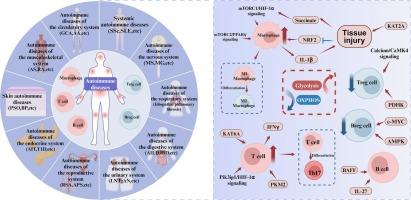Glycometabolic reprogramming of immune cells in autoimmune diseases
IF 8.3
1区 医学
Q1 IMMUNOLOGY
引用次数: 0
Abstract
Autoimmune diseases (ADs) are a classification of disorders that occur owing to the breakdown of immunological tolerance to self-antigens, leading to an immune response to these antigens and associated bodily harm. The pathogenesis and etiology of these diseases remain unclear. A growing body of research indicates that metabolic reprogramming of immune cells is crucial for immunological control. In particular, glycolysis, a crucial metabolic process in cells, is reconfigured to influence the phenotypic and function of immune cells, therefore playing a role in the onset and progression of ADs. This review elaborates on the involvement of glycometabolic reprogramming in ADs and explores the function of glycometabolic reprogramming in immune cells throughout disease progression. Furthermore, we examine the principal targets implicated and their influence on disease advancement. Finally, we provide a brief summary and outlook of studies related to glycometabolic reprogramming of immune cells in ADs, aiming to guide therapeutic strategies for these diseases.

自身免疫性疾病中免疫细胞的糖代谢重编程
自身免疫性疾病(ADs)是由于对自身抗原免疫耐受性的破坏,导致对这些抗原的免疫反应和相关的身体伤害而发生的一类疾病。这些疾病的发病机制和病因尚不清楚。越来越多的研究表明,免疫细胞的代谢重编程对免疫控制至关重要。特别是,糖酵解是细胞中一个重要的代谢过程,它被重新配置以影响免疫细胞的表型和功能,因此在ad的发生和进展中发挥作用。本文详细阐述了糖代谢重编程在ad中的作用,并探讨了糖代谢重编程在整个疾病进展过程中在免疫细胞中的作用。此外,我们研究了涉及的主要靶点及其对疾病进展的影响。最后,我们对ad中免疫细胞糖代谢重编程的相关研究进行了简要总结和展望,旨在指导这些疾病的治疗策略。
本文章由计算机程序翻译,如有差异,请以英文原文为准。
求助全文
约1分钟内获得全文
求助全文
来源期刊

Autoimmunity reviews
医学-免疫学
CiteScore
24.70
自引率
4.40%
发文量
164
审稿时长
21 days
期刊介绍:
Autoimmunity Reviews is a publication that features up-to-date, structured reviews on various topics in the field of autoimmunity. These reviews are written by renowned experts and include demonstrative illustrations and tables. Each article will have a clear "take-home" message for readers.
The selection of articles is primarily done by the Editors-in-Chief, based on recommendations from the international Editorial Board. The topics covered in the articles span all areas of autoimmunology, aiming to bridge the gap between basic and clinical sciences.
In terms of content, the contributions in basic sciences delve into the pathophysiology and mechanisms of autoimmune disorders, as well as genomics and proteomics. On the other hand, clinical contributions focus on diseases related to autoimmunity, novel therapies, and clinical associations.
Autoimmunity Reviews is internationally recognized, and its articles are indexed and abstracted in prestigious databases such as PubMed/Medline, Science Citation Index Expanded, Biosciences Information Services, and Chemical Abstracts.
 求助内容:
求助内容: 应助结果提醒方式:
应助结果提醒方式:


